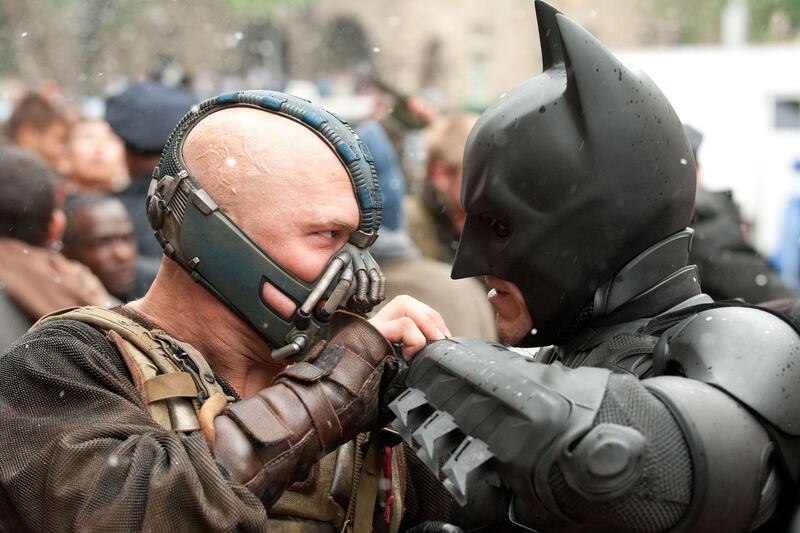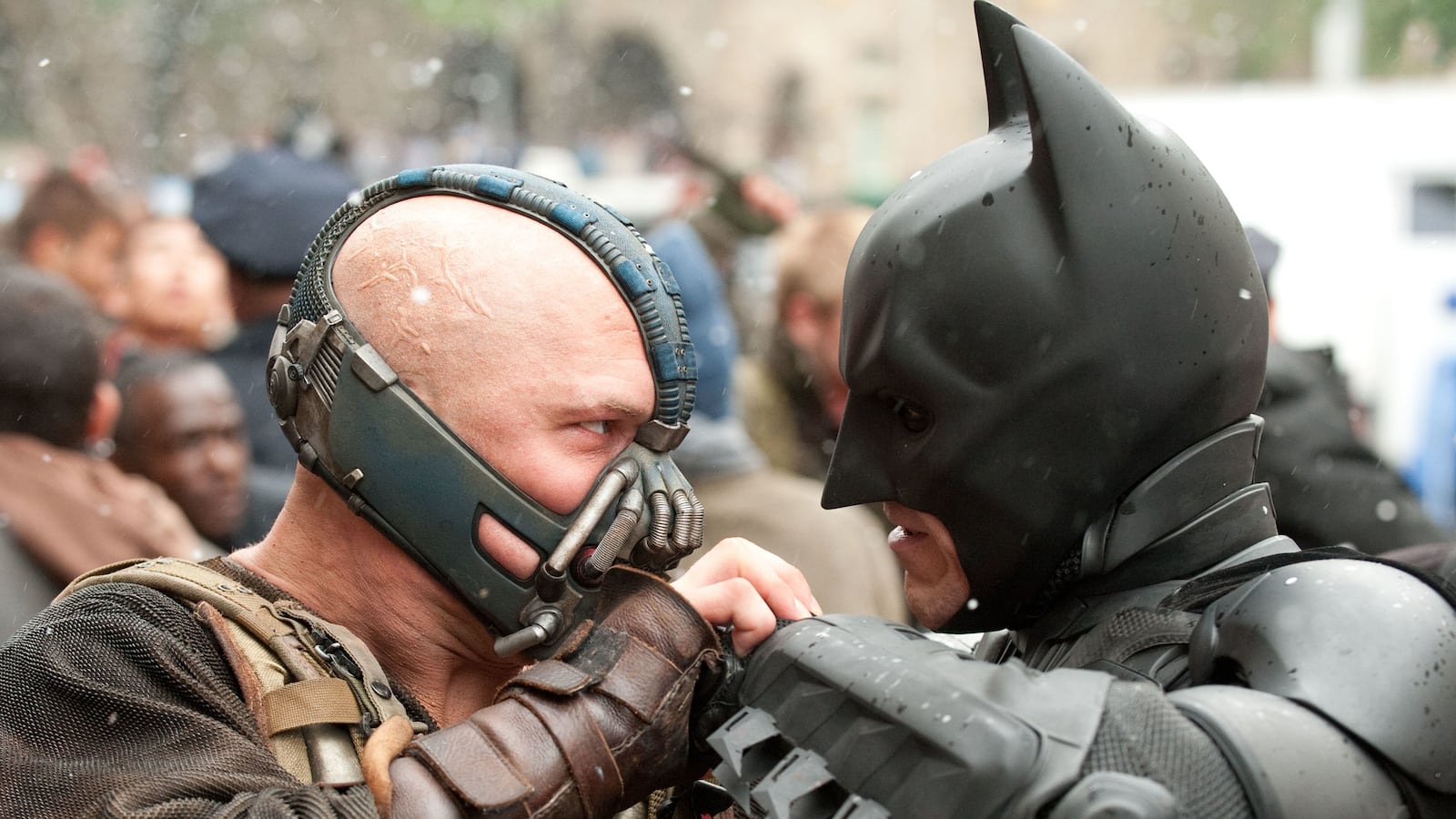In The Dark Knight Rises, Batman saves Gotham City. Could an invite to the Oscars be his reward?

Warner Brothers, the studio behind the summer blockbuster, is banking on it, launching an aggressive campaign to get the conclusion of director Christopher Nolan’s Dark Knight trilogy into the Oscar conversation. The film is getting a splashy Blu-Ray release Dec. 4—prime time for awards campaigning—and its very own “For Your Consideration” website. Nolan himself, notoriously shy when it comes to participating in the annual awards-show horse race, is even shilling for the cause. On Wednesday, he caved to years of requests and participated in a Film Comment Selects Q&A at Lincoln Center in New York, offering a detailed retrospective on his Batman series.
The end goal: the Best Picture nomination that has eluded the Dark Knight trilogy thus far—and, really, popcorn action flicks in general. But is this the one obstacle Batman can’t slay?
In 2009, The Dark Knight, the trilogy’s second installment, received a rare combination of rapturous critical response and commercial love. “With Heath Ledger’s passing and the incredible quality, the cult of support surrounding that film was intense,” Dave Karger, chief correspondent for Fandango and longtime Oscar guru, tells The Daily Beast. But when that year’s Oscar nominations were read, the film was missing from the Best Picture race, despite earning some of the year’s best reviews.
The snub was labeled a disgrace by some in the industry, and sparked a backlash among its most zealous fans. After all, the film’s 94-percent approval rating on review-aggregation site Rotten Tomatoes trumped eventual nominees The Curious Case of Benjamin Button (81 percent), Frost/Nixon (92 percent), and The Reader (61 percent) and tied nominee Milk and eventual winner Slumdog Millionaire.
The next year, in what is widely considered among Oscarologists to be a direct response to the snub, the Oscars’ Best Picture category was expanded to include 10 nominees, presumably so that more populist films could slip past those so-called snooty Academy voters.
“From everything I know [the Batman snub] is the main reason the Academy decided to change the Best Picture rule and have more than five nominees,” Karger says. “It’s very important that the Academy Awards speak to a large part of the movie-going audience. You never want to see Transformers get nominated, but if there’s a way for more popular movies to get in … it’s good for everybody.”
The visceral reaction to the snub is understandable. The films had a monumental effect on modern cinema, especially with respect to franchise films, the industry’s bread and butter. Never before had descriptors like “emotionally inspiring, aesthetically significant and critically important for America itself”—praise typical of The Dark Knight Rises reviews—been used in association with movies about men in tights.
“It’s a sign of how quickly things change in the movie business, but there was no such thing conceptually as a ‘reboot,’ [before The Dark Knight Rises]” Nolan said at the Q&A. It was eight years after Tim Burton’s last Batman film hit theaters when Nolan reinvented the saga with Batman Begins. “What I felt I hadn’t seen was [what I observed] in the comics which was Gotham as an ordinary world—a place in which we could live,” Nolan said. “And so, when Gotham sees Batman he’s as extraordinary as he would be in our world. What Tim did is place an extraordinary character in an extraordinary world.”
And yet, the trilogy’s knockout ending still faces a steep uphill battle to make it into the Best Picture race.
An uncomfortable liability is the film’s association with the shooting at a screening in Aurora, Colo. As The Wrap’s Steve Pond wrote after the tragedy in July, some Oscar voters may not be able to look past the grim air that hangs over the film. Glenn Whipp of the Los Angeles Times wondered if it was appropriate for there to be an awards campaign at all.
Even if the Aurora shooting doesn’t factor into voters’ decisions, the odds are still stacked against the film. To begin with, the expansion of the Best Picture category hasn’t exactly had its desired effect. While more commercially successful films such as The Blind Side, District 9, and Inception have been nominated over the years, “movies that have benefitted most from the extra slots are movies like Winter’s Bone, The Kids Are Alright, and A Serious Man—smaller films,” Karger says. (For many Academy voters, says David Poland a columnist at Movie City News, which curates the Gurus O’Gold Oscar predictions, this was actually a relief. “The big concern was that big, commercial, stupid movies would enter the Oscar race, but what happened was the opposite.”)
Currently, Gurus O’Gold of Movie City News don’t have The Dark Knight Rises in its Top 10 list of likely Best Picture contenders, with five films that all scored lower or the same on Rotten Tomatoes all ranked above it: The Master, Beasts of the Southern Wild, Flight, Life of Pi, and Anna Karenina.
For many, it boils down to the genre. Action films like The Dark Knight Rises or Skyfall, which also received an ecstatic critical reception, are ruled out because they’re not high-minded enough for Oscar voters. “In the end, they’re not interested in The Dark Knight,” Poland says. “They’re not interested in Spider-Man. No matter how good they are, they’re not terribly interested.”
That’s especially the case this year, in which the Best Picture race is atypically crowded. “Movies with car chases and shootouts don’t usually float the Academy’s boat,” Karger says. “There are so many strong movies this year. Look at the six or seven movies at the front of the line—Argo, Life of Pi, Les Mis, Lincoln, Silver Linings Playbook, Zero Dark Thirty—it’s not like it’s a super weak year and you have to stretch to include movies like Skyfall.”
So will Warner Bros. campaigning for The Dark Knight Rises succeed? “I think it has a shot. If I was putting money on it today I think it just misses. If The Dark Knight had been released this year with the current voting rules it would’ve gotten in. The Dark Knight Rises, I’m not so sure. The response to the movie might not have been strong enough.”
While Nolan is gamely participating in campaigning events like the Lincoln Center Q&A, he’s also aware that his film is not one that’s made to appease Oscar voters. “I wanted to create, first and foremost, an entertainment, something people could keep a distance from and enjoy.”
One billion dollars later, it’s safe to say that he did just that.




